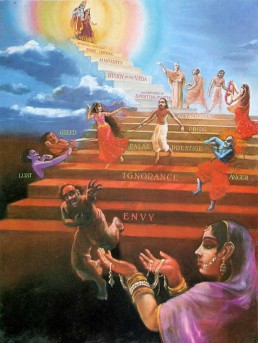In the very opening of this chapter (VII-7), discriminating the Self from the not-Self, it was shown how Krishna is the Spiritual Principle, the Common Truth that holds together the multiple universe of names and forms. It was also said (VII-14) that the three-fold mental temperaments (gunas), that work up the “divine illusion,” hoodwink the individual from right cognition of the Divine Self within him. But for the Conscious Principle thrilling the inert matter walls that seemingly encircle the spirit, neither our physical, nor mental, nor intellectual personalities can ever come to function, as they do now. It is very well-known that all men do not worship at the same altar. Each one approaches the same Truth by worshipping the idol of his own heart. Krishna here declares the sacred truth that in all Churches, Mosques, and Temples, in public places, or in private institutions, in the open, or on the sly, in the quiet huts, and in the silent caves — wherever and in whatsoever form, any devotee seeks to worship with Shraddha, “HIS FAITH DO I MAKE UNWAVERING.” A faithful follower of the Geeta can never be contaminated by sectarianism or intolerance. At the foot of every altar, it is Krishna, the Self, that constantly supplies more and more faith to water the expanding fields of devotion in the sincere devotees.
Applying this general statement to the subjective worship in the human bosom, we can very easily understand the greater import of this stanza.
In the world outside, it is very well-known that the greater the consistency with which an idea or an attachment is maintained by an individual, the greater does he become fixed in that temperament or relationship. The more often a particular type of thought is entertained in the mind, the deeper becomes that thought channel, strengthening that very mental impression. These deep-cut patterns of thought, ploughed along the valleys of the mind, indicate the pattern of desires which the individual had entertained. In the law that governs this psychological rule, we can spy and detect the Spiritual Reality and Its infinite and glorious might.
In short, the Lord says that “as we think so we become,” and the more we become, the more we think in the same given pattern. Applying this principle of psychology, it becomes clear, beyond all doubts, why everyone of us is bound by our own habits, and how we get chained by our own peculiar type of thinking. The sensuous are not to be condemned, and equally so, the divine need not be congratulated! Both of them are the exact products of their individual types of thinking. Thought belongs to the realm of nature (Prakriti); thoughts create the world and the all-pervading Self is the Essential Substratum (Purusha) that provides the world-drama with its stage and scenario.
WITH THIS EVER-GROWING FAITH, HOW DOES THE MAN-OF-THE-WORLD GAIN HIS PARTICULAR DESIRE?

